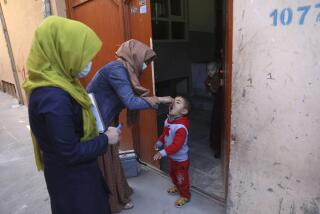Weakness in Polio Victims Held Not Life-Threatening
- Share via
BOSTON — A loss of strength some polio survivors experience years after recovering from the disease can be disabling but is apparently not life-threatening, researchers said Wednesday.
In the first long-term and most detailed study of its kind, researchers at the National Institutes of Health examined 27 polio victims who experienced new muscle loss and found they grew weaker at an average of 1% a year.
But the study also found that, despite early fears, none of the patients were suffering from relapses of polio or were stricken with similar illnesses.
‘Should Quiet Some Fears’
“The spirit of this is more positive than negative,” Dr. Marionos C. Dalakas said. “This should quiet some fears.”
Dalakas speculated that the strength loss was caused by nerve branches that were formed to compensate for the original disease that finally began to fail after being overused for many years.
Polio epidemics swept across the United States before a vaccine was developed in 1955. Many victims died while others were left with varying levels of paralysis.
Doctors began receiving reports several years ago from some of the estimated 300,000 polio survivors that they were experiencing new losses of muscle use, prompting fears they were suffering relapses or other diseases.
20% May Lose Strength
Dalakas estimated that 20% of polio survivors may suffer the loss of strength, known as progressive post-poliomyelitis muscular atrophy.
For the study, published in the New England Journal of Medicine, doctors examined 15 men and 12 women when they first complained of new muscle weakness an average of 28.8 years after recovering from the disease. They were examined again between 4.5 and 20 years later.
All of the patients experienced a loss of muscle use between the two examinations, but the amount of weakness varied from patient to patient. The deterioration would abate for several years in some cases, Dalakas said.
Researchers are working on drugs that could be used to treat such cases, he said.






